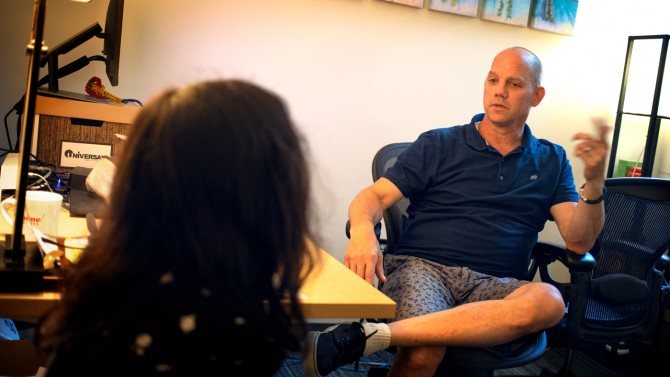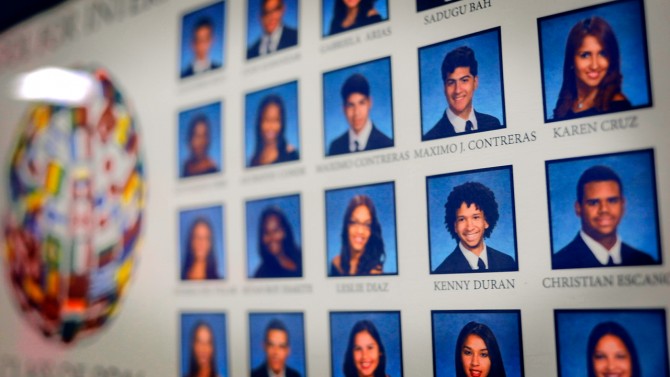Bronx high schoolers aim for college, via Cornell
By Susan Kelley Shelley Preston
When 15-year-old Shivani Ramsaran heads back to school Sept. 5, she’ll have a lot on her plate.
As a junior at Marble Hill School for International Studies in New York City, she’ll take three Advanced Placement classes – language, statistics and European history – as well as chemistry and Japanese. And she’ll study for AP exams and the SAT.
But she knows she can accomplish those goals, and more. Because this summer, she accomplished something even more difficult: She completed a three-credit college class at Cornell University’s Summer College.
“I definitely feel more prepared for junior year,” she said. “In Summer College, you’re put together with a lot of other smart kids. As we were talking to each other, I learned that my ideas had value. ... I could work with my ideas.”
Shivani Ramsaran is one of dozens of high schoolers at the Marble Hill School for International Studies in the Bronx who have benefited from college prep scholarships provided by Cornell’s School of Continuing Education and Summer Sessions and alumni.
In a typical summer, Ramsaran takes care of children at the daycare center her mother runs, one floor below her family’s South Bronx apartment, while her father does maintenance for the New York City Housing Authority. But this was not a typical summer.
In July, Ramsaran took Negotiations and Conflict Resolution at Summer College, part of Cornell’s School of Continuing Education and Summer Sessions (SCE). She stayed on the Ithaca campus for three weeks, along with 25 of her high-achieving Marble Hill classmates, who took SCE college prep programs.
A month before she took the Cornell class, Ramsaran said she felt prepared, nervous and excited all at the same time. “Who wouldn’t be nervous about being completely on your own and doing actual college work?” she said.
“That confidence means they’re more likely to succeed both socially and academically when they do go to college.”
Jim Schechter, director of Summer College
Getting those jitters out is exactly the point of Summer College, said Jim Schechter, director of Summer College.
“This program helps high school students feel more comfortable on a college campus and more confident about their ability to do college-level work,” he said. “That confidence means they’re more likely to succeed both socially and academically when they do go to college.”
Thanks to scholarships from Summer College and seven Cornell alumni, the program has prepared 56 Marble Hill students over the past five years to gain acceptance at colleges and universities. These include top-tier schools such as Swarthmore College, Middlebury College, Tufts University, Bennington College and the California Institute of Technology.
Ramsaran intends to join them.
“I am future-oriented,” she said. “My mom and dad came to New York from Trinidad 20 years ago for more opportunities. And they want to see me take advantage of those opportunities and go to a good college.”
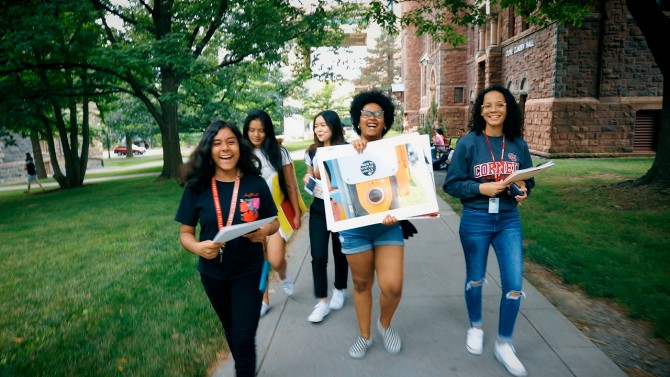
Marble Hill juniors Shivani Ramsaran, left; Giovanna Corcino, center with art; and Darcely Pena, right, return from an exhibition of work made during Corcino’s Summer College art class.
Stretching minds
As Ramsaran and seven other Marble Hill upperclassmen began three-week college classes at Summer College, 18 freshmen, along with principal Kirsten Larson and Marble Hill teacher Emily Lorper, arrived for a two-week SCE camp designed especially for them. Afternoons were spent hiking Ithaca’s gorges and swimming at a youth day camp run by Cornell’s Adult University, part of SCE. Mornings were spent learning a variety of skills, such as how to prep for and take tests, and the benefits of good sleep and nutrition.
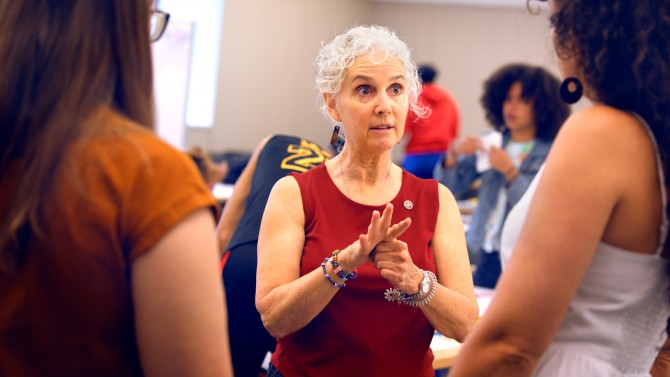
Study skills instructor Elise West makes a point during a break at the study skills camp for Marble Hill students.
Larson and Lorper observed, learning new teaching methods from study skills teacher Elise West, the former director of Cornell’s Learning Strategies Center.
“We believe very firmly at Marble Hill that students being aware of how they learn helps them to be better learners,” Larson said. “This is bringing that to the forefront for them.”
After just a few days, freshman Angel Estevez said, “I feel like my mind is being stretched.”
Ramsaran knows how he felt.
As a freshman the previous year, she and a dozen Marble Hill classmates had attended the study skills camp. She discovered she’s a visual learner. When she returned to Marble Hill, she began using the Cornell note-taking method. “Most people have their laptops out, copying word for word,” she said. “But I am actually making diagrams and only writing out key points in my notebook.”
Those skills proved valuable when she returned to Cornell in July, to take Negotiations and Conflict Resolution. After one week, her toughest challenge wasn’t academic, she said. It was social.
“Because I’m in a single room,” she said, “you’re not sure which people to be friends with, or how to make friends exactly. So you’re more on your own to find people who you can connect with.”
Thankfully, she said, the workload in her class – taught by Rocco Scanza, director of the School of Industrial and Labor Relations’ Scheinman Institute on Conflict Resolution – was manageable. “I thought it would be really, really hard, and a lot of writing,” Ramsaran said.
In fact, class participation was more important. “Just this morning, we carried on a conversation for over an hour about one negotiation we did,” she said. “I really liked that.”
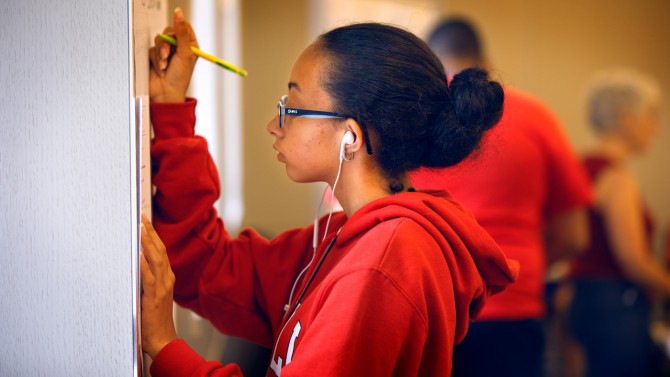
Gabriella Rosario, a sophomore at Marble Hill, participates in an activity at the study skills camp, where students learn strategies to maximize their academic success.
Expanding academic skills
Ramsaran’s class was one of 93 available to this year’s 1,377 Summer College students, with topics such as sustainable animal husbandry, debate, architecture, engineering and critical thinking.
“Participation in the program broadens students’ worldview, expands their academic skills and allows them to gauge their interest in and aptitude for attending a top-tier university or college,” Schechter said.
New York state students – 258 in all – attended Summer College this year, and 62 received scholarships from sources including SCE's David R. and Patricia Atkinson Rural Scholarship Initiative.
Among the alumni supporting the Marble Hill students are Jon Kopita ’87; Erica Karsch ’94 and her husband, Michael Karsch, a 1984 Summer College alumnus; and Erica’s father, Thomas Tuft.
The Karsches wanted to do their part to bridge the education gap in the U.S., and especially in New York City, where they live. Cornell is the ideal institution to help these thriving students, they said.
“Cornell has perhaps the most developed summer session programming in the country, and a deep range of resources to support the various academic and coinciding needs of high school students,” said Michael Karsch, explaining his and Erica’s commitment. “And it gives urban kids a chance to see if they enjoy a quieter setting for college.”
Added Glenn C. Altschuler, Ph.D. ’76, the SCE dean: “At the School of Continuing Education and Summer Sessions, we take seriously our commitment to educational opportunity and lifelong learning. We want to make sure Summer College and the study skills camp are part of our larger outreach and social commitment.”
Larson, the Marble Hill principal, said the experience helps the students adjust to college; they get a feel for being away from home, discover how they learn and experience a dramatically different environment.
“Some students were saying they feel so refreshed, without the pollution, the dirt, the city atmosphere. They’re really aware of how it makes them feel differently,” Larson said. “At home, they’d probably be staying inside. They don’t necessarily live in the safest areas; their parents are more protective, with good reason.”

A Marble Hill student created this schematic diagram about “doing what you love,” a topic covered in the study skills session. The exercise helps students develop a wide perspective on how their current interests can fuel their future studies and careers.
Success story
Though Marble Hill parents cheer on their children’s academic successes, Larson said, many are reluctant to let their children – especially their daughters – leave the Bronx. Marble Hill families come from around the world; more than 30 languages are spoken among the school’s 450 students. “The idea of spending two to three weeks in Ithaca is like telling parents their kid is going to spend time on Mars,” Larson said.
Ramsaran’s parents initially thought the program was located at Cornell Tech, in New York City. “They were shocked to hear I would be going upstate, to Ithaca,” Ramsaran said. “They were nervous about me going so far away for three weeks.”
She wasn’t so sure herself. “At first, thinking about being away from them for weeks was hard.”
To help put worried parents at ease, Schechter and Altschuler travel to Marble Hill each spring to talk about the program.
“It’s always a profoundly moving experience to see the commitment of the Marble Hill parents, who come to the information session after a long day of work, sometimes struggling to comprehend a presentation that may not be in their first language,” Altschuler said. “One can clearly see their pleasure, pride and anxiety at sending their children far away from home. Their zeal to make their children’s lives better is inspiring.”
Since the partnership began five years ago, Larson has seen an uptick in the number of students applying to and getting accepted at four-year universities.
“By the end of the program, I had tangible evidence that even at a highly reputable institution, I could perform well.”
Kenny Duran, Cornell Summer College alumnus
Those students include Kenny Duran. Now a junior majoring in physics at the California Institute of Technology, he was the first Marble Hill student to participate in the program.
Prior to Summer College, he had worried that even if he got accepted to a top university, he would be unprepared to handle the demanding workload. “By the end of the program, I had tangible evidence that even at a highly reputable institution, I could perform well,” he said. “That was extremely valuable information when I decided to apply to colleges the following fall.”
Summer College also made him feel more comfortable meeting people from all over the world; before Cornell, he had visited only one college, for one day. “Beyond that, I had never really left my bubble in the Bronx,” he said.
When Schechter learned Duran was interested in physics, he called Carl Franck, associate professor of physics, to ask if he’d be willing to meet with Duran.
He was. The meeting was one of Duran’s favorite parts of Summer College.
“I got to peek in a microscope and see some cells divide,” Duran said. “When I mentioned I had been looking for a tuning fork, he made a makeshift one on the spot, with a string and a metal bar that was lying around – the power of physics!
“We talked about how the Cornell High Energy Synchrotron Source works, and generally had a lot of fun talking about physics,” Duran said. “That enthusiasm has certainly guided me throughout my first three years at Caltech.”
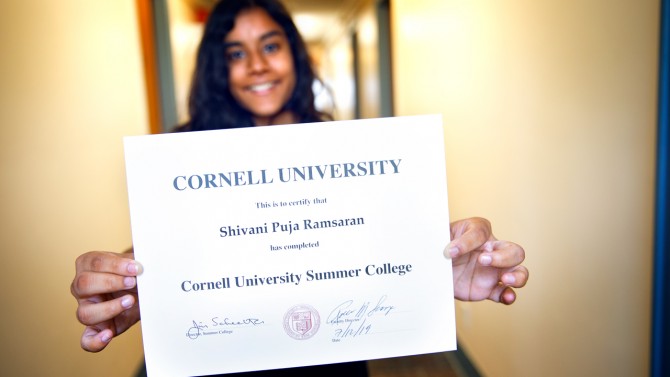
Shivani Ramsaran shows the certificate she received for completing a three-credit class at Summer College.
On the road home
At the end of her three-week class, Ramsaran hadn’t received her grade yet but was eager to. “I think I did really well,” she said.
In addition to the academic benefits, Summer College had prompted Ramsaran and her classmates to consider what they want in a university, Larson said. “One thing that I’m definitely glad to see is that they all want to go away to college,” Larson said. “I’m not saying that staying home is bad. But for a lot of our students, it’s fear, more than anything else, that seems to keep them in the city – fear and finances. By being here [at Cornell], the students realize, you can go away. And they’ve really enjoyed it.”
Ramsaran realized she, too, wants to go to college outside New York City. “I want to see the stars at night,” she said.
The most transformative lessons she learned at Cornell, she said, were those she had absorbed from students in her class, whom she never would have met otherwise. “You can learn something about life just talking to the people around you here,” she said. “My eyes have been opened.”
And her final grade in Negotiations and Conflict Resolution? She earned an A.
New York State Impact
South Bronx high schoolers aim for college, via Cornell
Media Contact
Get Cornell news delivered right to your inbox.
Subscribe